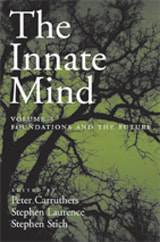
The Innate Mind: Foundations and the Future
The Innate Mind: Foundations and the Future. Edited by Peter Carruthers, Stephen Laurence, and Stephen Stich (Oxford University Press, 2007).
This is the third and final volume in a set of volumes on the subject of innateness, based on the AHRC Innateness and the Structure of the Mind Project. The extent to which the mind is innate is one of the central questions in the human sciences, with important implications for many surrounding debates. By bringing together the top nativist scholars in philosophy, psychology, and allied disciplines these volumes provide a comprehensive assessment of nativist thought and a definitive reference point for future nativist inquiry.
The Innate Mind: Foundations and the Future addresses such questions as: What is innateness? Is it a confused notion? What is at stake in debates between nativists and empiricists? What is the relationship between genes and innateness? How do innate structures and learned information interact to produce adult forms of cognition, e.g. about number, and how does such learning take place? What innate abilities underlie the creative aspect of language use, and of creative cognition generally? What are the innate foundations of human motivation, and of human moral cognition? The editors have provided an introduction giving some of the background to the debates about innateness and introducing each of the subsequent essays, as well as a consolidated bibliography that will be a valuable reference resource for all those interested in this area. The volume will be of great importance to anyone interested in the interplay between culture and the innate mind.
The Innate Mind: Foundations and the Future. Edited by Peter Carruthers, Stephen Laurence, and Stephen Stich (Oxford University Press, 2007).
This is the third and final volume in a set of volumes on the subject of innateness, based on the AHRC Innateness and the Structure of the Mind Project. The extent to which the mind is innate is one of the central questions in the human sciences, with important implications for many surrounding debates. By bringing together the top nativist scholars in philosophy, psychology, and allied disciplines these volumes provide a comprehensive assessment of nativist thought and a definitive reference point for future nativist inquiry.
The Innate Mind: Foundations and the Future addresses such questions as: What is innateness? Is it a confused notion? What is at stake in debates between nativists and empiricists? What is the relationship between genes and innateness? How do innate structures and learned information interact to produce adult forms of cognition, e.g. about number, and how does such learning take place? What innate abilities underlie the creative aspect of language use, and of creative cognition generally? What are the innate foundations of human motivation, and of human moral cognition? The editors have provided an introduction giving some of the background to the debates about innateness and introducing each of the subsequent essays, as well as a consolidated bibliography that will be a valuable reference resource for all those interested in this area. The volume will be of great importance to anyone interested in the interplay between culture and the innate mind.
Table of Contents
- Peter Carruthers, Stephen Laurence, and Stephen Stich. Introduction.
- Richard Samuels. Is Innateness a Confused Concept?
- Matteo Mameli. Genes, Environments, and Concepts of Biological Inheritance.
- Peter Godfrey-Smith. Innateness and Genetic Information.
- Thomas J. Bouchard, Jr. Genes and Human Psychological Traits.
- Gabriel Segal. Poverty of the Stimulus Arguments Concerning Language and Folk Psychology.
- Alan M. Leslie, C. R. Gallistel, and Rochel Gelman. Where Integers Come From.
- Stephen Laurence and Eric Margolis. Linguistic Determinism and the Innate Basis of Number.
- György Gergely. Learning “About” Versus Learning “From” Other Minds: Natural Pedagogy and Its Implications.
- Fei Xu. Rational Statistical Inference and Cognitive Development.
- Luca Bonatti. Of Pigeons, Humans, Language, and the Mind.
- Mark Baker. The Creative Aspect of Language Use and Nonbiological Nativism.
- Peter Carruthers. The Creative Action Theory of Creativity .
- Anna Papafragou. Space and the Language-Cognition Interface.
- Laurie Santos and Venkat Lakshminarayanan. Innate Constraints on Judgment and Decision-Making?: Insights from Children and Nonhuman Primates.
- Chandra Sekhar Sripada. Adaptationism, Culture, and the Malleability of Human Nature.
- Karen Wynn. Some Innate Foundations of Social and Moral Cognition.
- Daniel Kelly and Stephen Stich. Two Theories About the Cognitive Architecture Underlying Morality.
- Jonathan Haidt and Craig Joseph. The Moral Mind: How Five Sets of Innate Moral Intuitions Guide the Development of Many Culture-Specific Virtues, and Perhaps Even Modules.